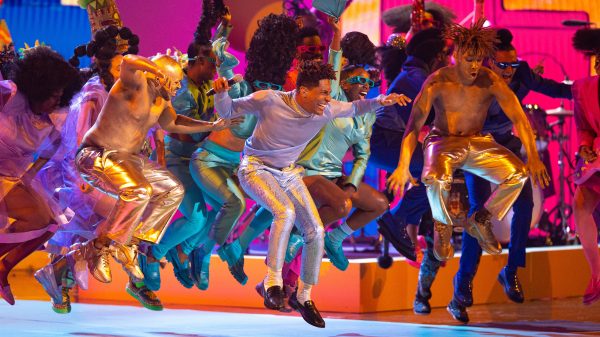From ‘We Are the World’ to ‘Worship,’ let’s recognize the transformative power of Black music
This Black History Month and Grammy weekend are prime moments to remember the universal power of Black music. “Notes on […] The post From ‘We Are the World’ to ‘Worship,’ let’s recognize the transformative power of Black music appeared first on TheGrio.

This Black History Month and Grammy weekend are prime moments to remember the universal power of Black music.
“Notes on faith” is theGrio’s inspirational, interdenominational series featuring Black thought leaders across faiths.
Music has long been described as a “universal language” for its ability to stimulate experiences of love, joy, and uplift across cultures. Musicians worldwide have flexed their creative brawn, tapping into music’s natural resources and the passions it often inspires to wield its power for good.
Universal in itself, Black music — which encompasses genres from country to rock ‘n’ roll — soothes our souls, gives us our soundtrack to our love lives, our gains and losses; it stirs our creatives, helps us generate ideas, and has empowered our most impactful social movements. Historically, music by Black musicians has shifted people’s lived experiences — and the marketplace. And as we prepare to celebrate the music industry’s biggest night, once again, our social and political climate demonstrates we need something that penetrates a little deeper to achieve collective transformation, one that compels a shift in the atmosphere or spirit.
As the African proverb instructs us: “The Spirit will not descend without a song.” Well, family, this Black History Month and Grammy weekend, let us remember what our ancestors and elders have long known about the power of Black music.
Consider the legacy of brilliance found in joining forces for the common good, as demonstrated in the commemoration of the 39th anniversary of the release of “We Are the World.” Dubbed “The Greatest Night in Pop” in the new Netflix documentary of the same name, the project’s recording session on Jan. 28, 1985, drew the brightest luminaries of the time to form the one-night-only supergroup USA for Africa. Conceived by creative activist Harry Belafonte to draw attention to global poverty and, in particular, wealth extraction in Ethiopia, the project, written by icons Michael Jackson and Lionel Richie and produced by Quincy Jones and Michael Omartian, was primed for impact as it gathered musical geniuses and wealth magnets for a common cause. With the final night of recording following that year’s American Music Awards, the single made history, selling over 20 million copies and earning four Grammy awards, enrapturing the masses while amplifying the famine devastating a significant portion of the African continent.
Arguably a brilliant cause-related marketing strategy, “We Are the World” channeled resources from an industry that has for so long and in almost every way exploited people of African ancestry to address their needs. Though aid projects have a contested history, fraught with myriad issues of ultimately harmful do-goodism by those unaware of local contexts and nuances, the value of harnessing the hope found in creative activism should not be lost on us.
What does it sound like to infuse creative activism with a personalized practice of faith that explores love and uplift?
The Grammys — one of the most prestigious awards in the entertainment industry — have a complex and evolving relationship with Black culture. Over the years, the Grammys have, however inadequately, celebrated the immense contributions of Black artists, producers, and industry professionals to the music world. Black musicians have left an indelible and undeniable mark on various genres, from jazz and blues to hip-hop and R&B, and worship and gospel, shaping the very foundation of both the United States’ and global music culture.
As we look at the Recording Academy’s broadcast tonight, it is essential to recognize the ongoing dialogue on the intersection of the Grammys and Black history. This conversation reflects the broader struggle for recognition, representation, and justice within the music industry and serves as a reminder of the powerful role music plays in shaping and reflecting the experiences of Black individuals and communities.
We see the continuation of this Black historical legacy in 2024 Grammy multi-genre nominee Jon Batiste’s album, “World Music Radio.” With his own brand of activism drawing from potent Black radio aesthetic techniques pioneered in his home region of New Orleans and the technicolor textures from music across the world, Batiste infuses his latest album with a key ingredient more overtly displayed than in “We Are the World”: worship. In his endeavor to guide people to uplift, he traffics in high frequencies.
“It’s a vibrational frequency of time and space coming together to create bliss and inspiration and purpose,” Batiste writes in the liner notes for his song “Worship.” “And those who know how to tap into that signal, it transports them to this region of the universe that no scientist has been able to detect or find the origin of.” Here, the artist provides the creative inspirations behind the album’s many sonic highlights — some interstellar, others much closer to home.
Homing in on the human experiences of transcendence, Batiste redefines worship by offering praise for whoever “you” might be — the everydayness of family, friends, and community — expanding from simply adoring a divinity outside of ourselves.
Batiste further explains the mantra-like reiteration device in the song, writing, “We wanted to create an experience that brought you to a sense of real perspective and appreciation of your own humanity and the collective of humanity. When you hear these lyrics over and over again as the chords swell and the synthesizers are crafted in this way … something about both of those sounds together is catharsis. It creates a release in people when you’re collected in a community, whether it’s at a festival or at a game at a stadium.”
Batiste is not alone. Whether reflecting on epic collaborations like “We Are the World” or worship-focused recording projects by collaborative artists ranging from Stanley Brown to Maverick City, Ye, Kirk Franklin, and more, this era of musicians seems poised to expose this generation to the gravitational pull found in combining creative activism with some form of devotion and worshipful posture. Judging from the success of all of these projects, it is not by chance that large-scale collaborative projects of transcendence remain what the music industry craves and responds to.
More to the point, given the ubiquity of Black music in everyday life, Black musicians and Black music are uniquely equipped to shift the status quo. With intentional use of the transformative power found in music, there is some remedy to the persistent ills facing people of African ancestry and the world we live in, empowering us to strengthen and reunite in sustainable ways.
Music has always been a powerful catalyst for change, and Black musicians continue to lead the way in using their creativity and faith to inspire transformation. As we celebrate Black History Month and the power of music this weekend, we must praise the enduring legacy of Black music — and its potential to save lives and change the world — one harmonious note at a time. May we realize opportunities to synchronize our vibes, get on one accord, and restore each other to create a better future for all.

Rev. Dr. Alisha Lola Jones is a faith leader helping people to find their groove in a fast-paced world, as a consultant for various arts and faith organizations and professor of music in contemporary societies at the University of Cambridge in Cambridge, England. She is an award-winning author of Flaming? The Peculiar Theopolitics of Fire and Desire in Black Male Gospel Performance (Oxford University Press). For more information, please visit DrAlisha.com.
Never miss a beat: Get our daily stories straight to your inbox with theGrio’s newsletter.
The post From ‘We Are the World’ to ‘Worship,’ let’s recognize the transformative power of Black music appeared first on TheGrio.












